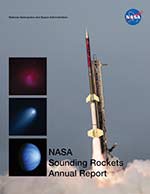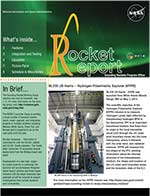RockOn! a space flight program for University students and faculty
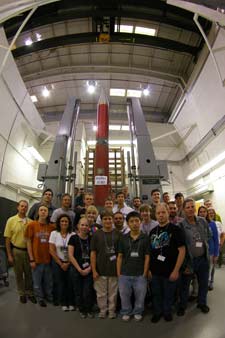 Students and faculty from universities around the country participate in the annual RockOn! flight opportunity. Arranged NASA Sounding Rockets Program Office and the Office of STEM engagement. RockOn! is a hands-on workshop teaching participants how to create a spaceflight experiment, program a flight computer, and collect and analyze data. Additionally, after attending RockOn, groups may participate in the more advanced RockSat-C and RockSat-X program. The RockSat-C and RockSat-X experiments are designed by students.
Students and faculty from universities around the country participate in the annual RockOn! flight opportunity. Arranged NASA Sounding Rockets Program Office and the Office of STEM engagement. RockOn! is a hands-on workshop teaching participants how to create a spaceflight experiment, program a flight computer, and collect and analyze data. Additionally, after attending RockOn, groups may participate in the more advanced RockSat-C and RockSat-X program. The RockSat-C and RockSat-X experiments are designed by students.
The RockOn! workshop participants arrive at NASA’s Wallops Flight Facility and are taught how to construct an experiment from a kit. A team of experts guide the RockOn! groups through construction, integration and testing of their experiment kits, and on the last day of the workshop, the launch of a NASA two-stage Terrier-Orion sounding rocket. There is definitely a lot to learn. The microprocessor and the sensor suit, consisting of accelerometers, pressure sensor, Geiger counter, and temperature sensors, are integrated to form a complete experiment system capable of taking measurements and collecting and storing data during flight.
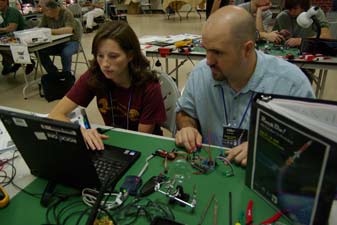 The faculty/student team from Northwest Nazarene University,
Idaho lead by Lawrence Miles are first time participants in the RockOn! workshop. The team is actively involved with the Idaho Space Grant Consortium and has launched
BalloonSats in the past. They plan to incorporate their RockOn! spaceflight experiment into future BalloonSat
launches.
The faculty/student team from Northwest Nazarene University,
Idaho lead by Lawrence Miles are first time participants in the RockOn! workshop. The team is actively involved with the Idaho Space Grant Consortium and has launched
BalloonSats in the past. They plan to incorporate their RockOn! spaceflight experiment into future BalloonSat
launches.
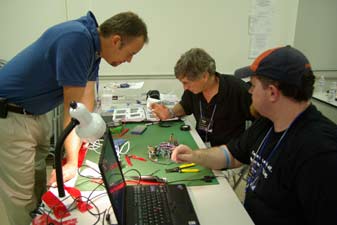 Peter Plumley faculty member from Syracuse University, NY is
here for the second time. Last year he attended as part of a
faculty team, this year he brought along a student, Aaron
Orbaker. Aaron appreciates the value of hands-on experience,
particularly when added to a solid theoretical foundation.
Peter Plumley faculty member from Syracuse University, NY is
here for the second time. Last year he attended as part of a
faculty team, this year he brought along a student, Aaron
Orbaker. Aaron appreciates the value of hands-on experience,
particularly when added to a solid theoretical foundation.
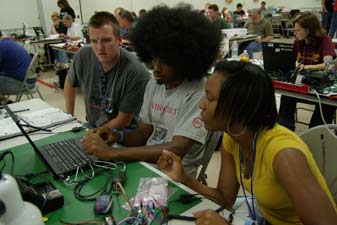 Jahnieka Griffin, a physics major and freshman from Hampton University in Virginia, is exploring her career options. “This workshop gives me an opportunity to explore space and spaceflight related careers,” she says while inspecting the experiment board
with her teammate Jayrik Hayes. Jayrik, a senior, also from Hampton University, focused on Aerospace engineering and planned to graduate in 2010. “This is an awesome hands-on workshop and an invaluable learning experience,” Jayrik says enthusiastically.
Jahnieka Griffin, a physics major and freshman from Hampton University in Virginia, is exploring her career options. “This workshop gives me an opportunity to explore space and spaceflight related careers,” she says while inspecting the experiment board
with her teammate Jayrik Hayes. Jayrik, a senior, also from Hampton University, focused on Aerospace engineering and planned to graduate in 2010. “This is an awesome hands-on workshop and an invaluable learning experience,” Jayrik says enthusiastically.
At 4:00 a.m. on launch day, the teams leave their hotel on Chincoteague to arrive Wallops Island in time for the 5:30 a.m. launch
window opening. For most of the participants, this is their first sounding rocket launch and they are clearly excited, as are the
Wallops staff members out on the Island watching the launch. At T-10 seconds the audience helps with countdown and at exactly 5:30 the Terrier-Orion rocket lifts-off and the RockOn! and RockSat experiments are on their way to space. The rocket reaches an altitude of 117 km and the payload starts its descent. A parachute slows the descent and softens the impact and sealed sections keep the payload afloat in the ocean until a recovery boat picks it
up. When the payload returns to Wallops Flight Facility, approximately
four hours after launch, the experiments are returned to the
teams and the data analysis can begin. Initial assessment indicates that all the RockOn! experiments worked. Data analysis for the more complicated RockSats will take a few days.
Back in the classroom at Wallops, Jahnieka is downloading the Hampton University team’s RockOn! data and is relieved to see the data file stream from the experiment to the laptop. “The launch was definitely exciting, but learning how to build circuits and use microcontrollers is the most important part of the workshop. We’re already discussing a RockSat experiment for next year,” Jahnieka says while the data is downloading.
To find out more about this flight opportunity and to apply to fly, visit:

